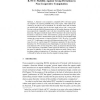Free Online Productivity Tools
i2Speak
i2Symbol
i2OCR
iTex2Img
iWeb2Print
iWeb2Shot
i2Type
iPdf2Split
iPdf2Merge
i2Bopomofo
i2Arabic
i2Style
i2Image
i2PDF
iLatex2Rtf
Sci2ools
WINE
2007
Springer
2007
Springer
K-NCC: Stability Against Group Deviations in Non-cooperative Computation
A function is non-cooperative computable [NCC] if honest agents can compute it by reporting truthfully their private inputs, while unilateral deviations by the players are not beneficial: if a deviation from truth revelation can mislead other agents, then the deviator might end up with a wrong result. Previous work provided full characterization of the boolean functions which are non-cooperatively computable. Later work have extended that study in various directions. This paper extends the study of NCC functions to the context of group deviations. A function is K-NCC if deviations by a group of at most K agents is not beneficial: in order to mislead other agents, at least one group member might compute the wrong outcome. A function which is K-NCC for every K is termed strong-NCC. In this paper we provide a full characterization of the K-NCC functions, for every K, and of strong-NCC functions in particular. We show that the hierarchy of K-NCC functions is strict. Surprisingly, we also...
| Added | 09 Jun 2010 |
| Updated | 09 Jun 2010 |
| Type | Conference |
| Year | 2007 |
| Where | WINE |
| Authors | Itai Ashlagi, Andrey Klinger, Moshe Tennenholtz |
Comments (0)

